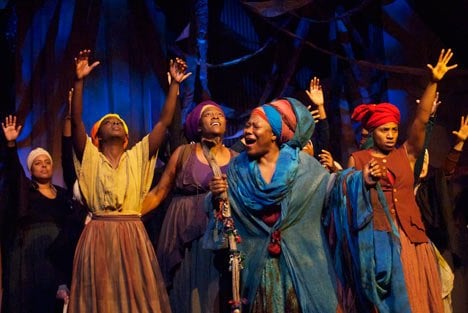
OBEAH OPERA by Nicole Brooks, directed by ahdri zhina mandiela (b current/Theatre Archipelago). At 918 Bathurst Centre (918 Bathurst). Runs to March 4, Wednesday-Saturday 8 pm, matinee Sunday 2 pm. $30, stu/srs $25. 416-533-1500. See listing. Rating: NNNN
One of the best-sung shows of the year, Obeah Opera also offers one of the most fascinating narratives: the history of four black slaves accused of witchcraft in 1692 Salem.
Nicole Brooks’s a cappella musical follows Tituba (Joni NehRita), Sarah (Saphire Demitro), Mary (Saidah Baba Talibah) and Candi (Brooks) from their time on a slave ship through their service in Salem and the accusations of sorcery that they and others faced.
Central to their story is the Elder (Macomere Fifi), a beggar woman who represents the spirit of obeah – an African/Caribbean practice that some regard as witchcraft, others as age-old healing – and gives succour and inspiration to the four despite her treatment as an outsider by the Puritan community.
In the production’s key scene, the Elder liberates the women from their prison cell and allows them to enter into their roles as obeah healers, each connected to deep natural powers and affirming her particular lineage. It’s a thrilling episode, the women and the accompanying 10-member chorus participating in an ecstatic celebration that testifies to those powers.
Brooks’s score, drawing on music that includes gospel, jazz, blues and Caribbean rhythms, is a wonderful vehicle for the material the show also functions as a celebration of the richness of black music.
That sound alone, as performed by both soloists and chorus, is exciting, but under ahdri zhina mandiela’s direction, the flow of the story and the movement of the characters – sometimes on the stage, occasionally in the audience – pulls us into the women’s world both physically and emotionally.
Mandiela has fine support from Tova Kardonne’s musical direction and Anthony Guerra’s choreography. Each of the central figures is visually distinct in Julia Tribe’s costumes Tribe has the chorus turn into the self-satisfied, censorious, hypocritical Puritans by donning black-and-white cloaks, the reverse side of the black shawls they wear around their waists when they appear as slaves.
I wish the text provided more about the four key women at present, they’re not well defined as personalities nor in terms of their orishas (their representations in the obeah spirit world). Possibly additional development will fill in these points for a later production.
And there should be another production, for even at this point, Obeah Opera is a wonderful, ultimately joyous work that celebrates past, present and future. Its magical, incantatory music is sure to bring you to your feet.












